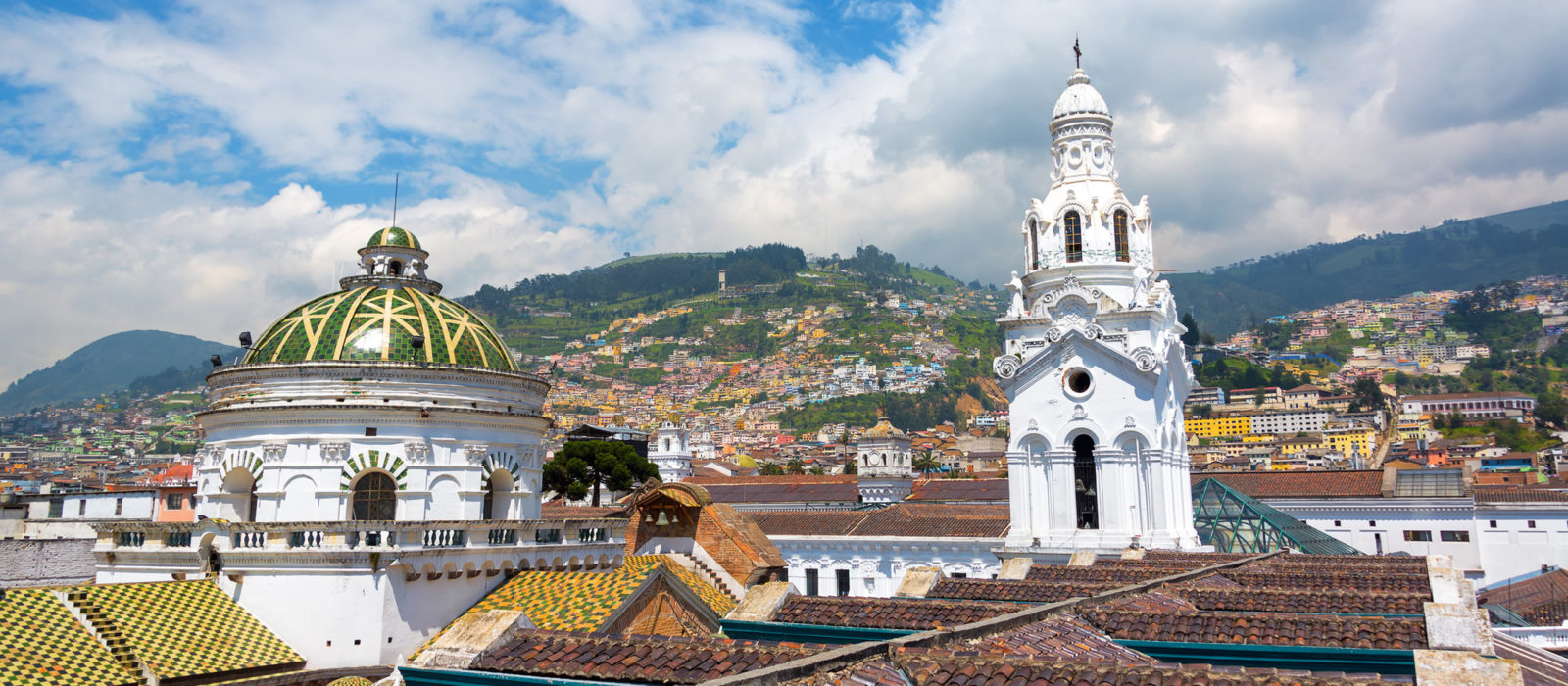Published on: October 12th, 2018
Last modified: November 2nd, 2023
We've compiled our list of most frequently asked questions to help you get prepared before your big adventure to Ecuador. Read through the questions, using the navigation bar on the left hand side of your page to move easily between the different sections.
Please note that requirements and advice can change so we recommend you check in with your own travel insurer, doctor and relevant local embassies before embarking on your adventure.
Are there any entry requirements for Ecuador?
Visas
There are currently no visa requirements for EU, US or Canadian citizens. Other nationalities who do need to apply for a visa should make sure they have enough time to complete the process before travel.
Please note that requirements can change and we recommend that our guests contact the local embassy in the country where you live for the most recent and up to date information.
Passports
All passports must be valid for at least six months after your intended departure and have at least two blank pages for immigration stamps.
We will confirm certain elements of your trip such as domestic flights, permits or train tickets using your current passport details. If a member of your party changes their name in their passport after booking (for example, through marriage or adoption) this could mean having to reissue important parts of the trip at an extra cost and subject to availability.
Do I need travel insurance?
Yes, once your trip is confirmed it is essential that you take out comprehensive travel insurance to cover you in case anything unexpected happens.
Ecuador does have entry requirements surrounding travel insurance making it essential to arrange the correct type of insurance cover for your vacation. The rules state that any person who enters Ecuador must have public or private health insurance for the duration of their stay. You may be asked to show proof of your insurance coverage (documents should be printed out as hard copies as well saved onto phones or devices) upon arrival. If you cannot provide proof of insurance you could be denied entry. If you are not asked to show these documents don’t worry, showing proof isn’t always enforced but you must be prepared just in case.
We always recommend that our guests get the maximum level of coverage that you feel comfortable investing in. Read more about travel insurance for US travellers here and for travellers from other countries here.
Do I need to visit a travel doctor before my trip?
Yes, you should visit a travel doctor before your trip as they may recommend certain vaccinations or medications before or during travel.
Some vaccines commonly recommended for travellers to Latin America include: Tetanus, Diphtheria, Polio, Typhoid, Hepatitis A, Hepatitis B, Rabies and Meningitis.
A yellow fever vaccination is not mandatory for those visiting the Amazon. However, there is still a risk of the disease in this region and other remote areas so you should discuss the vaccination with your travel doctor. If you’re travelling from a country with a yellow fever outbreak, you will need to provide your yellow fever certificate, particularly if travelling from Brazil, Angola, Democratic Republic of Congo and Uganda.
There is a malaria risk in some areas of Ecuador so you should discuss anti-malarial medications with your travel doctor, you can use your itinerary to explain where you’re going. We recommend bringing good quality mosquito spray and be careful to keep arms and legs covered during dusk and dawn. You should seek medical advice before applying strong mosquito spray onto young children.
Travelling at altitude
Altitude sickness can affect everyone and to different degrees. It’s best to take it easy for the first few days and keep hydrated. Being dehydrated can make you feel unwell when at altitude, particularly after a long flight. We strongly recommend you stay well hydrated, have meals which are easy to digest and avoid alcohol while you acclimatise. There are some medications available to help with travel at altitude and it’s important to discuss this with your travel doctor.
What do I need to know about my regional flights?
Typically regional flights in Ecuador will be on local carries with a luggage restriction of 23kg/55lbs and a hand luggage allowance of 8kg/17lbs per person in economy class.
Please let us know if you have seat assignment preferences and we will notify the airlines. Please note that seat assignment is subject to change and always at the discretion of the airline.
Our team on the ground will be able to check you in online 24 hours prior to your flight.
What will I receive from Jacada before I depart?
Travel pack
Before you head off on your adventure you will be sent a travel pack. The travel pack is full of great information and is also a beautiful keepsake. It is not necessary to travel with vouchers or confirmations on your trip but we do recommend having a printed copy of your travel itinerary to hand when you arrive into Ecuador.
Bon Voyage email
Around 2 weeks before you depart we will email you an electronic version of your travel pack including your domestic flight tickets. Once you’ve received this email your Travel Designer will reach out to arrange a time for you to talk on the phone to go over any last minute questions and talk you through the information we’ve sent over.
Do I need to bring the local currency?
Conveniently the currency in Ecuador is the US dollar. ATMs are always nearby in big cities but you must look out for the relevant symbol (VISA, MAESTRO etc) to ensure it is an international machine.
Credit cards are accepted in most hotels, restaurants and larger shops. Some restaurants and shops may ask to see your passport (or a photocopy) as a precaution against fraud when you use your credit card. When in small shops, cafes or local markets you will need to use cash to make your purchases.
Travellers cheques are accepted in some hotels in Ecuador. However we don’t usually suggest bringing them as they can be troublesome and time consuming to change.
Can you tell me about tipping and etiquette in Ecuador?
Tipping in Ecuador is more of a choice than an expected obligation. However, many places now include service charges as standard and it is increasingly common for tourists to leave tips.
In Ecuador 10% is usually included in the bill at restaurants, but you can tip over if you feel the service was worth it (an extra 10% maximum).
Porters and housekeeping should get US$ 1 per bag/per day, paid at the end of your stay. You can leave doormen US$ 1 or US$ 2 if they get you a taxi. Guides are typically tipped around US$ 6 to US$ 10 per person per day, and US$ 3 to US$ 6 to drivers per person per day. You can tip taxi drivers if they’ve been helpful (about 10%) or simply round up your fare to the nearest round figure amount.
Ettiquette
It’s important to be respectful when taking photographs of strangers when in Ecuador, particularly in rural areas. It’s best to ask your guide before starting to take pictures to make sure it’s appropriate and you may need to leave a small tip, your guide will be able to explain this to you. When visiting churches and some villages in rural areas it’s polite to cover your shoulders and wear longer pants to cover your knees.
What’s the weather like and how should I pack?
What you pack for your trip can change depending on the time of year and what you’ll be doing. Being so close to the equator means the sun will be strong throughout the year, often making day time temperatures quite warm. However, while at altitude, trekking or camping you will find temperatures much cooler at night and in the early mornings.
Below you’ll find our essentials list, we recommend chatting with your travel designer or concierge for more personalised suggestions based on time of year and activities for your trip:
- Layers – often in the day it is warm but temperatures drop at night, particularly when you are at altitude (Quito, Otavalo) so it is good to be able to add/take off a layer
- If you are trekking, be sure to pack extra layers
- Camera/Smartphone with all the necessary charging leads, plugs and batteries
- Convertible pants – light, fast drying one that zip off to form shorts
- Fleece sweater
- Light raincoat
- Hat to block the sun (it is strong in the Andes)
- A small backpack to take with you on day trips
- Money belt for cash and important documents
- In Ecuador there are many arts and crafts that can be bought and it is always great to return with lots of souvenirs from your trip, so remember to leave some space for these!
- Sunscreen
- Insect repellent
- Sun hat
- Day bag for carrying your all daily essentials
- Worn in, comfortable, waterproof walking shoes or hiking boots.
Most properties in Ecuador will offer a laundry service at an extra cost. Very remote hotels and Amazon cruises might not be able to do your laundry. You might find some pricing to be quite expensive so please do check the costs with reception before sending your items to be washed.
Should I make restaurant reservations?
We highly recommend that you make restaurant reservations in advance of your trip. Once your trip is confirmed you will be introduced to your concierge who will be able to assist you in not only making the reservations but also making recommendations based on your preferences.
What’s the transport like?
We only recommend taking transfers arranged by Jacada travel, the team on the ground, your hotel or a restaurant we’ve reserved for you. Although there are metered taxis and even uber in the major cities it shouldn’t be necessary on your trip.
How can I keep connected on my trip?
Plugs and power
For Ecuador the plug type has two flat parallel pins. Ecuador operates on a 120V supply voltage and 60Hz.
Wifi and internet connection
Wifi is common in all larger city hotels. Smaller, remote properties do usually have wifi but the connection can be patchy and is not always available throughout the entire property, sometimes only being available in the common areas or in the rooms.
If you require a regular, reliable source of wifi it is important to discuss this with your travel designer or concierge before departure so that you can be prepared for what’s available on your itinerary.






